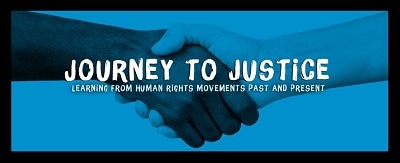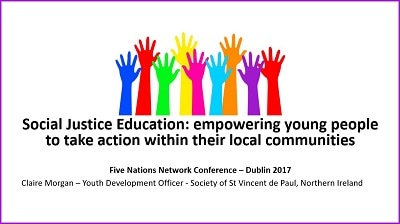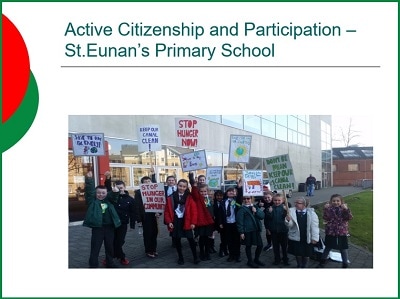- About
-
Conferences
- Publications
-
Funded Projects
- FNDPs 2019-20
- FNDPs 2017-18
- FNDPs 2016-17
- FNDPs 2015-16
-
Completed SSRIs
>
- Promoting Values and Citizenship through Human Rights Education
- Enabling Student Voice in the Classroom
- Campaign! Make an impact
- Promoting citizenship and values education in primary schools facing challenging socio-economic circumstances: an exploratory pilot
- Beyond Sectarianism - new thinking for a new generation
- Meeting the cross curricular challenge
- SSRI Awards >
- Citizenship
- Join
Workshop and seminar resources
A series of four seminars and workshops were provided from participants across the five nations.
|
Journey to Justice
Facilitated by Parul Motin and Martin Spafford, Journey to Justice This workshop showed, through film, storytelling and creative arts, how Journey to Justice's model linking history, the arts and social change has been transformative for different groups of vulnerable young people and has touched people of all ages across the UK. Download the following documents accommpanying the workshop:
Journey to Justice aims to help people feel able and equipped to take action for social justice, both in the realities of their own lives and in campaigns for change. The work makes connections between past struggles such as the US civil rights movement and present challenges to see how what people did in the past can affect how we deal with what affects us now. They look at what works in effecting change, and why. |
|
Social Justice Education: empowering young people to take action within their local communities
Facilitated by Claire Morgan, Society of St Vincent de Paul This workshop explored how the Society of St. Vincent de Paul, as educators, approach active citizenship or social justice education with young people. It focused on the importance of critical thinking within social justice research and action projects, the idea of youth-led action and how young people view social injustices in their world. The workshop also provided practical resources and pedagogical strategies in how to interact with young people within the classroom. Download the presentation accompanying the workshop The Society of St. Vincent de Paul has dedicated its history and work to the eradication of poverty and social exclusion. More recently, SVP Ireland developed a National Youth Development Programme whereby its main focus is ‘to provide positive opportunities for young people to engage in social action in local communities and encourages social and personal development.’ |
|
The role of active citizenship and participation in engaging, empowering and raising attainment
Facilitated by Claire Dunphy and Anne Docherty, St Eunan’s Primary School St. Eunan’s pupils develop as empowered active citizens through learning about real world issues and campaigning to bring about positive change in their community and wider world. In recent years they have developed a successful whole school interdisciplinary approach to global citizenship and learning for sustainability whereby children learn through real and motivating contexts such as the Global Goals and the United Nations Convention on the Rights of the Child. This success was recognised in 2016 by their achievement at winning a Scottish Education Award for Learning for Sustainability. In this seminar, they shared the very significant impact their whole school approach has had on learners and explored some fundamental questions that have arisen, regarding expectations and differentiation. Download the presentation accompanying the seminar St Eunan’s school was a recipient of a Five Nations Development Project grant in 2015 for their ‘Food Equity for All’ project. |
|
Watch Lesley Emerson's keynote lecture at the 2016 BERA conference: Education for 'political generosity': the role of schools in supporting young people's understanding of politically complex societies
|
Education for Political Generosity: helping young people navigate politically complex societies
Facilitated by Lesley Emerson, School of Education and Centre for Children’s Rights, Queen’s University Belfast Young people are growing up in an uncertain political world and as such citizenship education has an increasingly important role to play in enhancing their 'critical citizenship'. This workshop explored approaches to assisting young people in understanding the political complexity of the societies in which they are living, through classroom strategies designed to develop their capacity to think critically (that is, politically) about current local and global issues. In addition, the workshop drew on research evidence from the teaching of controversial issues in Northern Ireland to explore the idea of fostering 'political generosity' amongst young people - a rights-based approach to political identity. The workshop provided participants with the opportunity to examine how these transformative pedagogical principles can be applied in their own contexts. |
- About
-
Conferences
- Publications
-
Funded Projects
- FNDPs 2019-20
- FNDPs 2017-18
- FNDPs 2016-17
- FNDPs 2015-16
-
Completed SSRIs
>
- Promoting Values and Citizenship through Human Rights Education
- Enabling Student Voice in the Classroom
- Campaign! Make an impact
- Promoting citizenship and values education in primary schools facing challenging socio-economic circumstances: an exploratory pilot
- Beyond Sectarianism - new thinking for a new generation
- Meeting the cross curricular challenge
- SSRI Awards >
- Citizenship
- Join



